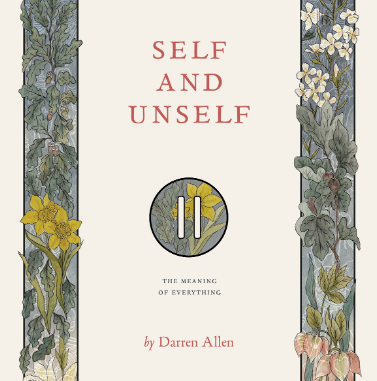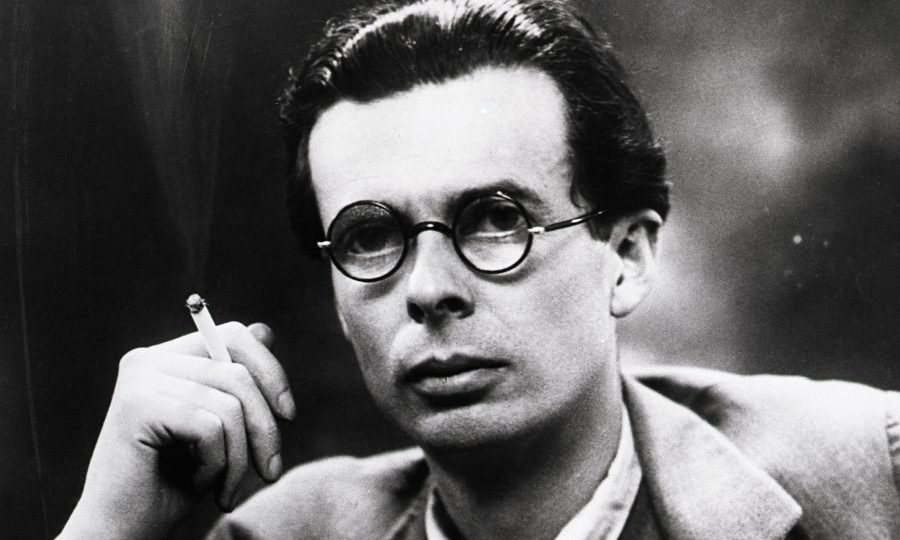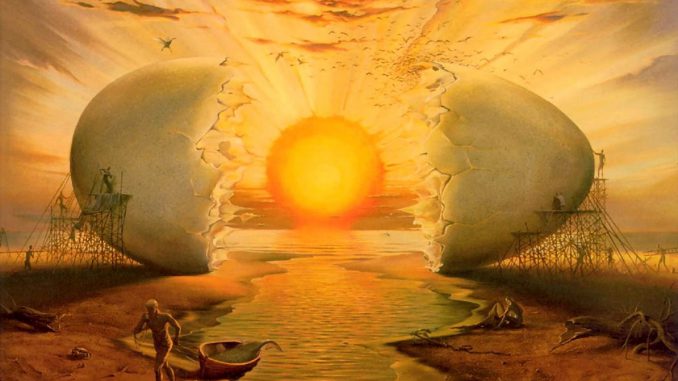
“Philosophy which was once the pursuit of wisdom has become the possession of a technique”, as the great Indian thinker Sarvepalli Radhakrishnan once warned. (1)
So it is greatly refreshing, in 2021, to come across a new philosophical work whose (achieved) aim is not to perform self-conscious intellectual gymnastics or to catalogue and categorise the philosophical offerings of previous writers, but to impart wisdom.
The subtitle of Darren Allen’s book Self & Unself is ‘The meaning of everything*‘ and the asterix points to the addition ‘(*not literally)’. (2)
This is a jokey nod to the kind of humourless literal thinking, described in the pages to come, which could not allow itself to appreciate the ironical undertones of the subtitle and would feel obliged to rebuke Allen for claiming to having provided such an utterly comprehensive account in a mere 400 pages of print.
Humour, in fact, plays an important part in Self and Unself – something which again sets it apart from most of the works our culture would classify as philosophical.
Sometimes it is a question of a laugh-out-loud turn of phrase or choice of words, such as when Allen warns against allowing oneself to “slump into the pudding of ordinariness that makes up the mass of mankind”, (3) describes consumer society as “a grim Disneyschwitz” (4) or declares that the vast majority of people are so predictable and eager to conform because “they come pre-subjugated”. (5)

Other comic moments are more conceptual, such as his pondering over the non-existence of “postmodern restaurants (selling postcards of food)”, (6) or the thought that an abstract philosopher is “like a man who empties a box to see what is inside it”. (7)
On further occasions, the humour comes from a deliberately-exaggerated bluntness which suddenly punctures the serious and learned tone of the surrounding prose.
Allen announces with some authority, for instance, that “people who can tolerate raw lighting, bad smells, loud noise, harsh emotions, mental junk-food, pointless activity and institutional subservience are, despite nursing whatever hyper-sensitivities they are constitutionally prone to, generally speaking, morons” (8) and also judges that the most shallow and inept category of human being is the “physically attractive”. (9)
Beneath the humour lies Allen’s sadness, which I very much share, at the degraded condition of modern humans, “highly specialised infants who can do nothing but suckle at the tit of the machine”. (10)
The fairies and trolls departed, driven out by technology
He describes today’s tendency to “consider the universe to be entirely comprised of separate comprehensible parts, particles or granules relating to each other in predictable ways in order to produce a measurable outcome”. (11)
Allen notes that we once lived in “a world permeated with magic; until the fairies and trolls departed, driven out by technology”, (12) where “the self still blended seamlessly with the mythic universe, which centred man and his fellows in nature, gracefully ordering their progress through it”. (13)
Not just our lives but also our thinking have been shorn of all connection to reality, in other words to nature and thus deprived of all depth and authenticity, reduced to the blind confusion of an auto-isolated ego.

This is not how it should be, as Allen says: “Great philosophy, taking the principle of nature as its source and subject, is like something in nature, the growth of ivy perhaps, or the song of a wren, or the activity of an ant’s nest; messy perhaps, erratic here and there, but it holds together as one, and it speaks”. (14)
Real philosophy is in fact the self-expression of nature, and the universe of which it forms part, via the human capacity for thought and language.
The idea of nature is never far away from the concept of the feminine, it being the feminine from which we are all born (natus).
Allen writes: “The source of creation might be presented as an egg, or as a lake, or as a serpent, but all these symbols, and many like them expressive of fecundity, completeness or generative power, are representations of the common mythological symbol of unself, the archetypal Great Mother”. (15)
He adds that the first sex to “fall” from a state of natural grace was man, who became gripped by existential fear. “Women, children, unfallen others, the human body, and beyond that, the natural universe, including consciousness itself, became alien entities which had to be disciplined and controlled”. (16)

In searching for responses to the debased human condition in modern society, Allen finds inspiration in the Perennial Philosophy, as propounded by Aldous Huxley, Karl Jaspers and others, although he rightly warns that because of the way authentic thinking is so often co-opted and corrupted by charlatans, the perennial philosophy needs to be picked out “like blackberries from a forest of thorns”. (17)
This perennial philosophy presents us with a truth which has been buried underneath layer upon layer of lie by all the separated thinking of our culture (including that of various religions and “spiritual” schools).
He notes: “Despite differences in style and emphasis, there is fundamentally no difference between the message of Lao Tzu, Chuang Tzu, Jesus of Nazareth (and the great mystics inspired by him), the message of the Upanishads, the Puranas and the Bhagavad Gita”. (18)
The core of this timeless understanding is the concept of oneness, the essential truth that is always denied by the dominant mindset, in every dimension of life and thought.
The “scientific” fragmentation of reality into separate facts, causes and effects goes hand in hand with an artificial division of that all-embracing oneness into separate perspectives of “subjectivity” and “objectivity”.

As I mused myself a few years back, a lot of confusion around objectivity arises from the way that we cannot actually be truly objective about a world of which we are part. But that does not mean that there is no actual, objective, reality: “A goldfish in a bowl will never be able to look at the bowl, and at himself swimming around the bowl, and gain an objective impression of it. But the bowl, containing the goldfish, exists nonetheless”. (19)
The problem, and this is the basis of Allen’s analysis, is that the modern human has lost touch with the fact that they belong to a larger reality, has sawn off the branch on which they were sitting and falsely imagines themself to be something unique and separate.
It is impossible for them to have what Allen terms a “panjective” view of reality, because they do not understand that when they view the universe around them, this is really the universe viewing itself, through the eyes of one of its countless (human) facets.
The self, or ego, because it is this separation from the whole, simply cannot recognise or know this separation, he explains, “any more than a torch can ‘know’ darkness”. (20)
What I particularly admire about this book is the way in which Allen applies the idea of this separation between self and unself through every aspect of our being, thinking and living and explains how the problem is always essentially the same, whether it manifests itself in mediocrity and shallowness, in the confusion between language and reality or in the degradation of art.
What remains when quality is subtracted from self is quantity
Particularly important is the link he makes between the separation of self from unself and the loss of meaning and quality in our culture – the loss, in fact, of any understanding that meaning and quality can even exist.
He writes: “Quality is the ‘entry’ of unself into self. The various words we have for quality – beauty, truth, intelligence, wit, courage, confidence, innocence, sweetness, sensitivity, goodness, generosity, genius, love, joy, intensity and so on – express the appearance of unself-meaning under different circumstances in the self… What remains when quality is subtracted from self is quantity”. (21) “If quality is ultimately unselfish, then it is not ultimately something about which self can have direct knowledge”. (22)
In the final pages of the book, Allen goes even further and presents the self/unself divide in a way which casts new light on what he has been saying and might encourage the reader to start again at the beginning with this in mind.
Despite his insistence that he is not offering any “hope”, this work is not only intellectually stimulating but also uplifting.
Allen is convinced that “the entire egoic world must – and will – fall” (23) and observes: “Everything at the end of empire is completely integrated with everything else, which is why it all had to rise together, and just as it all had to rise together, so it all must, and will, fall together”. (24)
Eventually, he says, a point comes when the illusion and power of ego will shatter. “Until that grim, chaotic time, the individual must resist and refuse”. (25)
In his vision, the conscious human being, who has released his attachment to the world of artifice, does not fall when it does.
Instead, he “remains standing; on a new earth, watered with tears of joy, of gratitude. He is not, after all mad and sick and dead; it was just winter, and now it is spring”. (26)

See the expressive egg site for more details on the book.
- Sarvepalli Radhakrishnan, An Idealist View of Life (London: Unwin Hyman, 1988), p. 144.
- Darren Allen, Self & Unself: The meaning of everything (expressive egg books, 2021).
- Allen, p. 81.
- Allen, p. 252.
- Allen, p. 375.
- Allen, p. 286.
- Allen, p. 42.
- Allen, p. 104.
- Allen, p.167.
- Allen, p. 356.
- Allen, p. 27.
- Allen, p. 313.
- Allen, p. 306.
- Allen, p. 47.
- Allen, p. 296.
- Allen, p. 317.
- Allen, p. 340.
- Allen, p. 338.
- Paul Cudenec, Nature, Essence and Anarchy (Sussex: Winter Oak, 2016), p. 130.
- Allen, p. 30.
- Allen, p. 55.
- Allen, p. 57.
- Allen, p. 400
- Allen, p. 399.
- Allen, p. 399.
- Allen, p. 410.
Leave a Reply